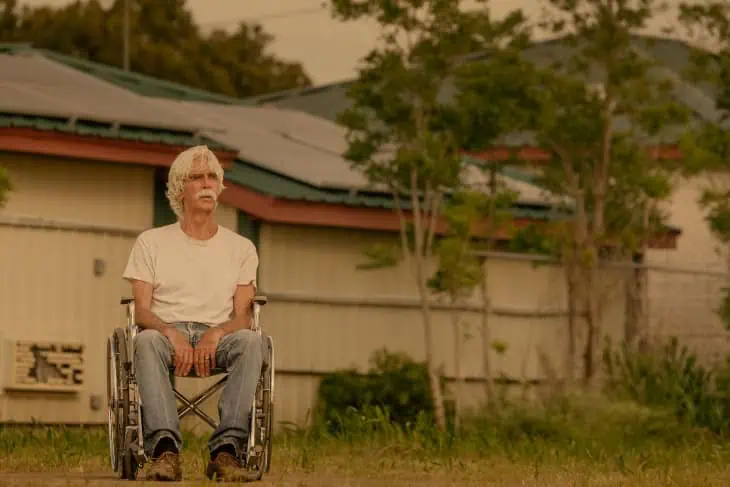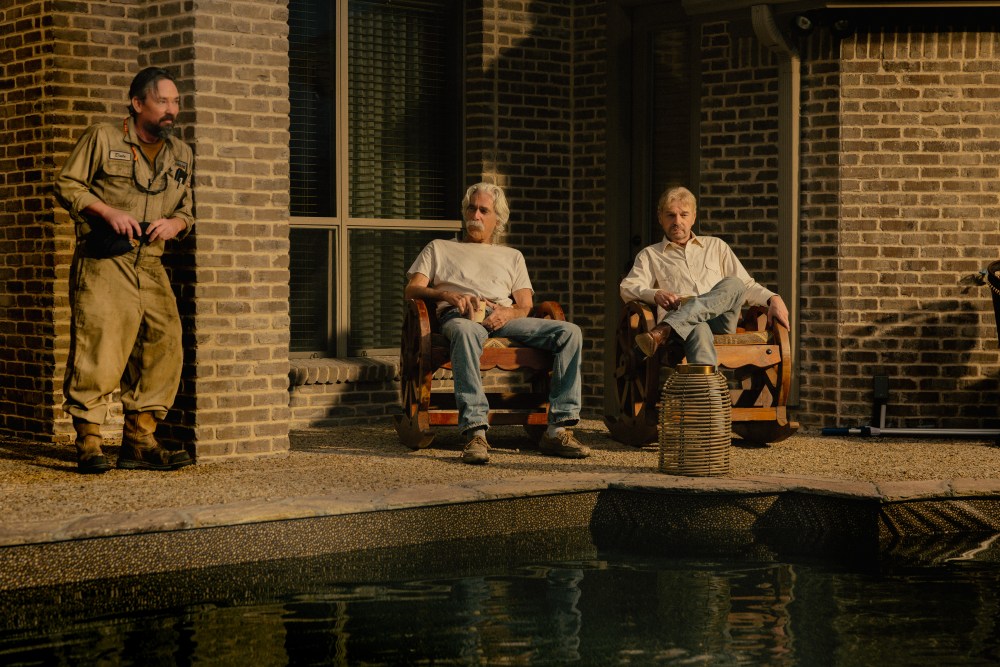The Mustache Returns to Texas: Sam Elliott's Defining Role
The second season premiere of Landman opens not with the oil rigs or boardrooms that define Taylor Sheridan's drilling drama, but with something far more intimate: an old man in a wheelchair, stubbornly watching the West Texas sunset against the protests of his nursing home attendants. When a nurse named Hank finally approaches with grave news—"She took her afternoon nap, just didn't wake up"—we witness Sam Elliott's face crumple with a grief so raw it transcends decades of Western stoicism. This is T.L. Norris, and in under three minutes of screen time, the legendary actor establishes what will become Season 2's emotional anchor.

For a show that shattered Paramount+ records with 9.2 million viewers in its first 48 hours—a 262% increase over Season 1's premiere—Elliott's arrival represents far more than celebrity stunt casting. As T.L., the estranged father of Billy Bob Thornton's crisis-manager protagonist Tommy Norris, Elliott brings gravitas that elevates Landman beyond its oil-boom setting into something approaching genuine American tragedy.
"I Called Taylor and Cried": The Casting That Changed Everything
The story of how Elliott joined Landman has become the stuff of Hollywood legend. According to multiple interviews, it began with a text from Sheridan—a simple message that eventually evolved into phone conversations and, ultimately, a two-year contract. For Elliott, who had largely stepped back from acting after 1883 due to personal and medical issues, the role represented both a creative challenge and an emotional journey.
But perhaps no one was more moved by the casting than Thornton himself. In an interview with Entertainment Tonight, the typically composed actor admitted to an uncharacteristic display of emotion: "This is no joke, and it's kind of embarrassing," Thornton confessed. "When Taylor told me, I told my wife, and I called Taylor back and I was crying. I said, 'That's the perfect person because we have a similar vibe and know each other.'"

The connection between the two actors runs deep—they first worked together in the 1993 Western Tombstone, and both appeared in Sheridan projects (1883 and a Thornton cameo in that same series). Elliott had been, in Thornton's words, "an inspiration to me and a hero of mine for so long." Now they would finally share substantial screen time, playing father and son in a relationship defined by absence, regret, and the hard silences that characterize men who've spent lifetimes in the oil fields.
Three Generations, One Brutal Legacy
What makes T.L.'s introduction so powerful is how it completes a generational triangle that defines Landman's true dramatic core. At the bottom is Cooper Norris (Jacob Lofland), Tommy's ambitious son who strikes oil in his first wildcat well and finds himself on track to become a millionaire before he's old enough to legally drink. In the middle stands Tommy (Thornton), the crisis manager who navigates between roughnecks and billionaires, trying to keep the machinery of M-Tex Oil running while his personal life remains perpetually combustible. And now, at the apex, sits T.L.—wheelchair-bound, estranged, carrying decades of unspoken grievances and a lifetime in the very industry that has shaped and scarred all three men.
"I think we're still diving," Elliott told The Hollywood Reporter when asked what audiences would learn about Tommy through his father. "It's very emotional for me—this part and this full season. Moreso maybe than most of the other things I've done."
That emotional weight stems from Sheridan's masterful decision to make the father-son relationship as much about what isn't said as what is. When Tommy finally calls his father to inform him of his mother's death, the conversation crackles with the tension of years spent apart, of choices made and roads not taken. For a show that often operates at the decibel level of exploding oil wells and boardroom confrontations, these quiet moments between Elliott and Thornton become revolutionary—a reminder that Sheridan, when focused, can craft male relationships with genuine psychological depth.
From 1883 to Landman: Sheridan's Western Universe Comes Full Circle
Elliott's casting represents a significant full-circle moment for Sheridan's expanding television empire. In 1883, Elliott played Shea Brennan, the haunted wagon train leader guiding the Dutton family's ancestors to Montana. Thornton appeared in a memorable cameo as Marshal Jim Courtright. Now, in Landman, their roles have reversed and deepened—Elliott joins Thornton's oil-field saga, bringing with him the mythic weight of countless Western roles spanning five decades.
This isn't mere fan service. Elliott has become Sheridan's spiritual link to the Western genre's golden age—a living embodiment of the laconic masculinity and frontier ethics that underpin all of the creator's work, from Yellowstone to Mayor of Kingstown. His mustache alone carries more Western authenticity than entire cable series. But it's his ability to convey devastating vulnerability beneath that granite exterior that makes T.L. Norris work.
"The reality of how dangerous working on oil rigs is, like the skill it really takes and the risk," Demi Moore noted in a recent interview about the show's authenticity. "It's very real that when they leave for work, they may not come back." That same existential danger hovers over the Norris family saga—three generations of men who've gambled their lives and souls on West Texas crude.
The Age Paradox: Making Father and Son Work
Here's a fascinating detail that speaks to both actors' craft: Sam Elliott is 81 years old. Billy Bob Thornton is 70. In real life, they're separated by just eleven years—less than the typical father-son age gap. Yet on screen, the relationship never feels forced or implausible.

"You see Sam in the wheelchair and you see me walking around, beating people up and you go, 'OK, that's his dad,'" Thornton explained to The Hollywood Reporter, addressing the age question with characteristic pragmatism. "It's all in the way we portray the characters and Taylor's vision."
Indeed, Elliott's physicality—the wheelchair, the weathered face, the voice that sounds like it's been filtered through sixty years of cigarette smoke and West Texas dust—creates an immediate visual hierarchy. More importantly, both actors understand that playing father and son is less about biological accuracy and more about embodying specific energies: T.L. represents the dying past, Tommy the embattled present, and Cooper the uncertain future.
What Male Emotional Complexity Reveals About Landman's Gender Problem
Here's where the T.L. storyline becomes particularly illuminating: while Landman Season 2 has faced intense criticism for its treatment of female characters—particularly Ali Larter's Angela and Michelle Randolph's Ainsley, who many viewers find one-dimensional and offensive—the show excels at portraying male vulnerability and emotional complexity.
The contrast is stark and troubling. While Angela's storylines devolve into dinner-table meltdowns and PMS jokes (yes, really), and while Ainsley remains stuck in a loop of bikini scenes and cringe-worthy sexual conversations with her father, T.L. and Tommy's relationship unfolds with genuine pathos. Elliott and Thornton are given space to be complicated, wounded, aging, afraid—fully realized human beings grappling with mortality, regret, and the possibility of reconciliation.
"And just with the layers of complexity, he's really creating very dimensional women," Demi Moore insisted in a recent defense of Sheridan's writing, referring to her own character Cami Miller's evolution from trophy wife to oil company CEO. "We may start in one place, but it may not be where we end up."
Perhaps. But the Season 2 premiere's audience score of 37% on Rotten Tomatoes—compared to Season 1's 68%—suggests viewers aren't buying it. Meanwhile, in virtually every review, the T.L. and Tommy dynamic receives praise. Deadline's Mike Fleming Jr. wrote that the father-son relationship "reverberated with both Thornton and Elliott" in ways that felt "painfully real."
Record Viewership, Divided Reception
The numbers tell a complicated story. Landman Season 2's premiere achieved 9.2 million global viewers in its first 48 hours, crushing Paramount+ records and demonstrating Taylor Sheridan's continued commercial dominance. The show sparked over 250,000 social media interactions, trending on X (formerly Twitter) throughout premiere weekend. Critics awarded the season an 81% "fresh" rating on Rotten Tomatoes—up from Season 1's 78%.
But audiences tell a different tale. That 37% audience score represents a dramatic fall from grace, with many reviews specifically calling out the Angela/Ainsley storylines as "Jerry Springer" material that ruins an otherwise compelling drama. Interestingly, even in negative reviews, the T.L. and Tommy scenes receive exemptions—proof that Sheridan and his actors have struck gold with this particular relationship.
"Season 2 is ultimately showing signs of more promise after its first three episodes," wrote Jeff Ewing for Collider, awarding the season a 6/10. "It's impossible to say what Landman's true trajectory will be this season, but it's already a bit closer to a well that hits than it was the first time around."
That "well that hits" increasingly looks like the emotional core Sheridan should have been drilling all along: the three-generation Norris saga, with Elliott's T.L. as the capstone.
What Lies Ahead: The Unfinished Business of Fathers and Sons
As Landman Season 2 continues its ten-episode run (new episodes drop Sundays on Paramount+), the central question becomes whether the T.L. storyline can sustain its emotional momentum while the show juggles corporate intrigue, cartel threats, and those controversial domestic scenes.
Early glimpses suggest reason for optimism. Promotional materials show T.L. being brought back to Midland to live with Tommy's household—a setup ripe for both comedy and drama as the taciturn old wildcatter encounters Angela's theatrical personality and Ainsley's chaos. Elliott and Thornton have teased "very emotional" scenes yet to come, suggesting the show will continue exploring the wounds between father and son.

"There's always more that unfolds," Demi Moore noted about Sheridan's approach to character development—and nowhere is that more apparent than in how slowly, carefully, the show is unspooling T.L.'s story.
The Soul of the Show
In a television landscape glutted with anti-heroes and violent spectacle, there's something quietly revolutionary about Landman's decision to ground its second season in an old man's grief and a middle-aged son's guilt. Sam Elliott, at 81, brings a lifetime of accumulated wisdom and weariness to every frame. Billy Bob Thornton, at 70, matches him with the desperate energy of a man trying to outrun his father's shadow while inadvertently casting the same shadow over his own son.
"Tommy and T.L. and Cooper—three generations of men in this business," Elliott reflected in a recent interview. "That's where the real drama lives."
For all of Landman's explosions, boardroom machinations, and sexual controversies, Elliott may have identified the show's true north star. In the relationship between a dying father and his crisis-manager son—both scarred by the same industry, both struggling to articulate love through layers of masculine silence—Taylor Sheridan has found his most emotionally honest material.
The question now is whether the rest of Landman can rise to meet it. As T.L. watches another West Texas sunset, waiting for a reconciliation that may or may not come before time runs out, viewers are watching too—hoping Sheridan knows what treasure he's struck in casting Sam Elliott, and praying he doesn't let it slip away in favor of cheap drama and offensive caricatures.
Because in this Texas epic of fathers and sons, Sam Elliott isn't just another Western legend doing a victory lap. He's the emotional core the show has been drilling for all along—the well that finally hits water in parched earth. And when he and Thornton share the screen, something rare happens in Sheridan's usually bombastic universe: silence becomes eloquence, and masculinity finds its most powerful expression not in violence or bravado, but in two old men trying, finally, to speak the truth to each other before it's too late.



